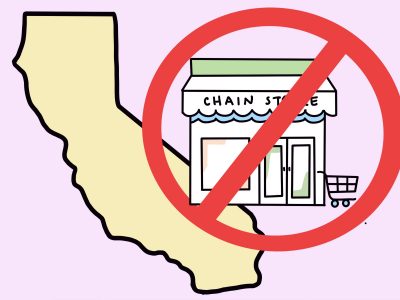At the base of the Topatopa mountains lies Ojai, California, a town boasting beautiful adobe architecture. The town of just under 8,000 is a quiet tourist destination for those in Southern California. All the way across the country is Nantucket, Massachusetts. The city’s New England brick-and-timber buildings on the coast of the Atlantic look nothing like Ojai’s red clay roofs, but these two towns are linked by a unique approach to local economies.
Both cities have banned chain stores from their commercial districts.
Nantucket banned chains with more than 14 locations in 2006, and Ojai followed suit with a ban on chains with five or more locations in 2007. Wanting to preserve the unique qualities of their downtowns, both municipalities have held their positions strongly for well over a decade now.
Some publications have made Ojai known as “the town with no Starbucks,” but I find this tagline dull and deceptive. It makes the town seem as though it has little to offer, but that is the opposite of the case. Grab your morning coffee from delightful gems of the neighborhood like Java & Joe or Beacon Coffee company.
Local residents of both towns will tell you that it’s important to them to preserve the unique qualities of their hometown. The argument that allowing chain stores would disrupt the “character of the town” is a helpful one in this case, but it should be noted that homeowners have used similar arguments in order to prolong housing scarcity in affluent neighborhoods.

California has been fighting its housing scarcity for decades, but local residents frequently protest new development plans that would improve housing access and affordability. Referred to as NIMBYs for shouting “Not In My Back Yard!” to development plans, these homeowners protest to slow or stop new housing projects in order to preserve their neighborhoods home value or, in some unfortunately unsurprising cases, demographic makeup.
It’s a tightrope to walk. Tight commercial restrictions in Ojai allow a unique appeal for its residents and tourists, while promoting equality and opportunity for smaller businesses to get off the ground. On the other hand, the tight restrictions for housing in larger metropolitan areas have led populations to be priced out when housing supply can’t meet the influx of demand.
Smaller towns like Ojai by definition won’t face the same demand for housing as larger cities with major employers — at least not for the foreseeable future. Housing restrictions are a unique problem of inequity for larger cities to fix, but commercial restrictions on chain stores can apply to cities of all sizes.
The best part about initiatives passed by smaller tourist towns like Nantucket and Ojai is that their good decisions are already spreading to larger cities. Jersey City restricted chain stores to 30% in 2015, and people have pushed for restrictions on chains in Toronto and areas of Manhattan.
Part of what makes a vacation destination refreshing is the unique layout of unfamiliar shops and restaurants. The convenient mediocrity provided by fast food chains and so called “formula stores” is useful for saving time, but not for enjoying your time. If policies to promote more small-scale retailing became common practice in cities across North America, unique downtown destinations could be across the street, rather than across the state
























































































































Marie • Apr 22, 2022 at 5:10 am
Congratulations Ojai.
This is why I visit your town every six months to relax and get away from the likes of Los Angeles County.
I enjoy the independent (non chain) establishments. Basically, Ojai offers just enough quaintness.